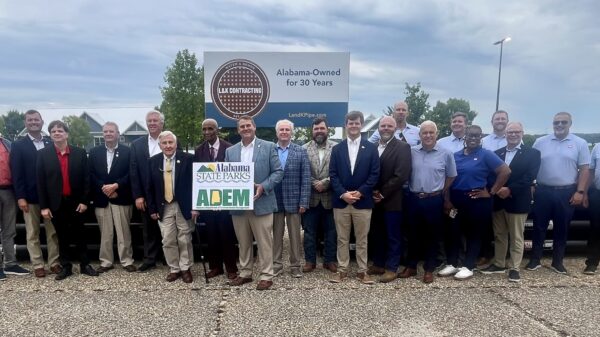The Alabama Department of Environmental Management said $52.6 million that Alabama has been awarded by the U.S. Environmental Protection Agency to help public water systems address “emerging contaminants” will complement ADEM’s ongoing efforts to improve the state’s drinking water and sewer systems.
Last year, ADEM awarded $463 million to public drinking water and wastewater systems across the state to deal with longstanding infrastructure needs. That funding is from a combination of sources, including the Bipartisan Infrastructure Law, the American Rescue Plan Act and the State Revolving Fund. The grants will finance projects to make clean drinking water and proper sewage disposal more accessible and reliable for hundreds of thousands of Alabamians.
The $52,638,000 the EPA announced this week for Alabama is in addition to those funds and will be used specifically for eliminating contaminants in drinking water. Just as it did with the $463 million awarded to water and sewer systems last year, ADEM will determine where the funding is needed and allocate the funds.
“This is more good news for Alabama as we continue to work to upgrade our water infrastructure,” ADEM Director Lance LeFleur said. “We are grateful to the EPA for recognizing the needs in Alabama, especially in some of our under-resourced communities, and for allocating this significant funding to meet those needs. Alabama is actually receiving more money than some of our sister states with larger populations.”
The EPA funds, part of $2 billion from the Bipartisan Infrastructure Law the EPA is allotting to states and territories, are being made available to communities as grants through EPA’s Emerging Contaminants in Small or Disadvantaged Communities (EC-SDC) Grant Program, according to an EPA press release. The grants will enable water systems to take steps to remove emerging contaminants such as PFAS from their drinking water supply.
PFAS, or per- and polyfluoroalkyl substances, are a class of manmade chemicals used in water repellants, coatings and numerous other consumer and commercial products. PFAS are found throughout the environment at locations across the nation and the world.
ADEM has been testing for PFAS in Alabama for several years. Since 2020, ADEM has also required water systems in the state to test for the presence of PFAS in drinking water. Studies have linked PFAS to health effects in humans and animals.
“’Alabama has been a leader in addressing the PFAS problem through testing and requiring the cleanup of contaminated sites,” LeFleur said. “Investments such as these new grants will allow us to focus even more on assisting those drinking water systems where PFAS are a particular concern.”
The Bipartisan Infrastructure Law will invest $5 billion over five years to help communities reduce PFAS in drinking water, the EPA said.
More information about PFAS in Alabama can be found on ADEM’s website at https://adem.alabama.gov/programs/water/drinkingwater/pfasupdate.cnt.






















































